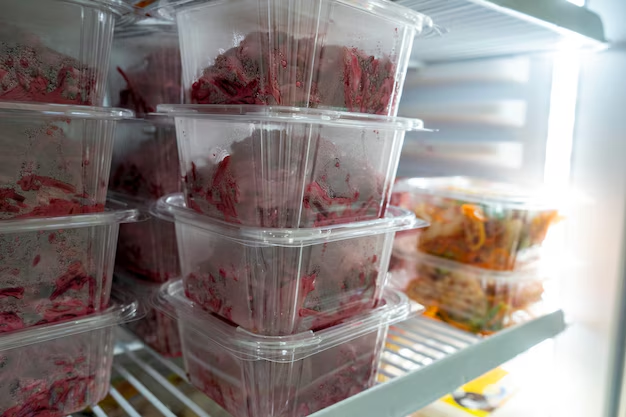How Long Can You Keep Deer Meat in the Refrigerator?
Deer hunting season is an exciting time for many, offering not just the thrill of the hunt but also the rich, nutritious reward of venison. However, once you've got your deer meat, a crucial question arises: How long is deer meat good for in the refrigerator? Knowing the answer ensures you enjoy fresh, healthy venison without risking spoilage. Let's delve into the essentials of storing deer meat properly to extend its shelf life and maintain its quality.
🥩 Understanding the Basics of Deer Meat Storage
Deer meat, often referred to as venison, is a lean red meat that's prized for its distinct flavor and nutritional benefits. Proper storage of venison is crucial to maintain its quality and ensure it’s safe to eat. Generally, storing meat involves some differences and nuances compared to more common meats like beef or chicken. Here's what every venison enthusiast should know:
Why Proper Storage Matters
- Food Safety: Improper storage can lead to bacterial growth, making the meat unsafe.
- Quality Preservation: Maintaining the texture and flavor of venison relies on adequate storage conditions.
- Nutritional Integrity: Correct storage retains the nutrients that make venison a healthy choice.
Key Factors Affecting Storage
- Temperature: Keeping deer meat within the correct temperature range is vital to prevent bacterial growth.
- Humidity: Too much moisture can affect meat quality, leading to spoilage.
- Air Exposure: Minimizing air contact prevents oxidization and freezer burn in longer storage situations.
🕑 How Long Can Venison Last in the Fridge?
Deer meat can last in the refrigerator, but its longevity depends on several factors, including freshness, storage conditions, and handling. Following the best practices will help you keep your venison fresh until you're ready to cook it.
Safe Refrigeration Times
- Raw Venison: Generally, fresh venison can last in the refrigerator for about 3 to 5 days.
- Cooked Venison: After cooking, venison should be consumed within 3 to 4 days.
Indicators of Spoilage
Even within the should-be-safe window, it's important to check your venison before consuming.
- Look: Discoloration might suggest spoilage.
- Smell: Any off or strong odors often indicate bacteria.
- Touch: Slimy textures could signal decay.
🧴 Best Practices for Storing Deer Meat
To enjoy your venison at its best, follow these best practices for storing deer meat in your refrigerator:
Initial Preparation
- Cool Quickly: Once harvested, cool the deer meat promptly to slow bacterial growth.
- Trim and Clean: Remove excess fat and clean the meat thoroughly to minimize contaminants.
- Wrap Correctly: Use airtight packaging (e.g., vacuum seal bags or plastic wrap) to reduce air exposure.
Storage Tips
- Proper Placement: Store meat on the bottom shelf to prevent juices from contaminating other foods.
- Consistent Temperature: Keep your fridge set below 40°F (4°C); this temperature slows bacterial growth.
- Labeling: Clearly mark packages with the date of storage to keep track of freshness.
❄️ Freezer Storage for Extended Shelf Life
For longer storage, freezing is a great option. Venison can maintain quality in the freezer for several months if stored properly.
How to Freeze Deer Meat
- Pre-Freeze Preparation: Clean and portion the meat to suit meal planning before freezing.
- Wrap and Seal: Double wrap meat in freezer paper, plastic wrap, or vacuum-sealed bags to protect from freezer burn.
- Label Accurately: Clearly date and label each package for easy identification and rotation.
Longevity and Quality
- Venison can last up to a year in the freezer without significant loss of quality.
- Using a vacuum sealer can extend freezer life and reduce chances of freezer burn.
Thawing Tips
- Slow Thawing: Thaw in the refrigerator to maintain texture and prevent bacterial growth.
- Avoid Room Temperature: Do not thaw deer meat at room temperature to prevent potential contamination.
🔍 Exploring Related Aspects of Venison
To fully appreciate your venison, it's helpful to understand a bit more about this unique meat, from its benefits to preparation methods.
Nutritional Highlights of Venison
- Lean Protein: Low in fat and high in protein, making it a healthier red meat option.
- Rich in Vitamins: Venison is a good source of B vitamins and minerals like iron and zinc.
- Calorie Count: Lower in calories compared to beef, supporting weight management.
Cooking and Enjoying Venison
- Flavor: Deriving a rich, gamey flavor, which pairs well with many robust and aromatic spices.
- Versatility: Perfect in stews, roasts, burgers, and even jerky.
- Tenderizing Methods: Use marinades or slow cooking for tender, delicious results.
🤔 Final Thoughts on Venison Storage
Proper storage is key to enjoying the full benefits of venison. By understanding storage timelines and best practices, you can ensure that your deer meat remains safe, tasty, and nourishing.
Quick Storage Tips 🕒
- Fridge: Consume within 3-5 days for raw, 3-4 days for cooked.
- Freezer: Lasts up to a year; keep well-wrapped and dated.
- Check: Always assess for spoilage before consuming.
Remember, quality venison starts with careful handling and continues with diligent storage. Develop a routine for storing your game meats, and you'll enjoy great-tasting venison all year round. Happy hunting and happy eating!

